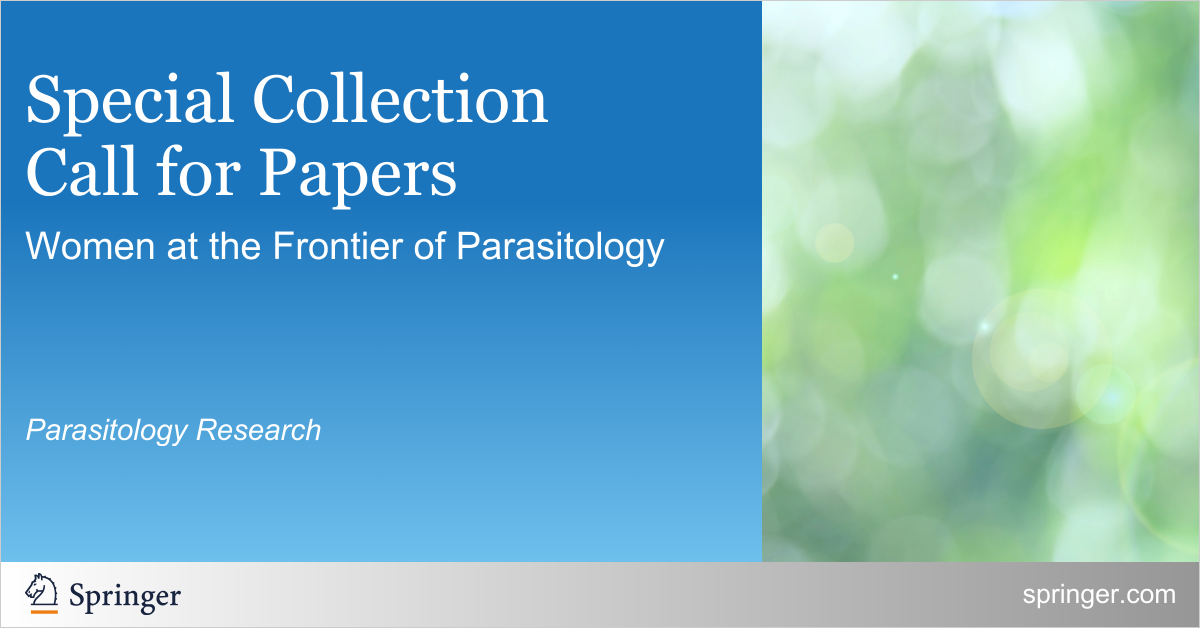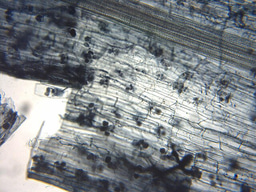Call for Papers: Women at the Forefront of Parasitology Research
Published in Microbiology

Follow the Topic
-
Parasitology Research

This journal is a broad readership, international, peer-reviewed journal publishing significant and original contributions on the latest developments in parasitology across a variety of disciplines, including biology, medicine, and veterinary medicine.
-
Acta Parasitologica

This is an international, peer-reviewed journal, publishing original research on all aspects of parasitology and host-parasite relationships.
-
Systematic Parasitology

This is an international, peer-reviewed journal, focusing on the systematics, taxonomy, and nomenclature of a broad range of parasites.
Related Collections
With Collections, you can get published faster and increase your visibility.
Parasites of fish and other aquatic organisms in the Anthropocene
The idea of this Issue, conceived during the last International Symposium on Fish Parasites (XI ISFP, Mérida, Mexico, January 2025) aims to collect research papers and reviews, focusing on the general and specific impacts of anthropogenic environmental changes on the biodiversity (at both species and gene level), ecology, and evolution of parasites of aquatic organisms.
Climate change, pollution, overfishing, and habitat degradation continue to reshape aquatic ecosystems. Thus, research that explores how parasite-host interactions may also shift under environmental stressors, is welcome. Studies on the possible implications for biodiversity, fisheries, food security, and public health related to the risks associated with parasitic invasions and zoonoses in aquatic ecosystems under the anthropogenic impacts, are also included.
Colleagues are invited to submit a short Synopsis about their possible contribution, to the Guest Editors' email address.
(simonetta.mattiucci@uniroma1.it; ppdleon@enesmerida.unam.mx; miguel.rubio@inecol.mx)
The following are some of the topics of interest for this Special Issue:
· Diversity, distribution and ecology of fish parasites – and their shifts during the Anthropocene
· Invasive parasites of fish and crustaceans, and their impact
· Parasite-driven pathology in fish – if possible, in wild populations
· "Omics” approaches to understand parasites’ responses to environmental stressors
· The influence of wild parasites on aquaculture
· Zoonotic fish parasites under the "One Health"approach
· Parasites as conservation tools – and subjects
· Thermal tolerance and climatic niches of parasites
· Host-parasite interactions in a changing environment
· Parasite evolution in the Anthropocene
Publishing Model: Open Access
Deadline: Ongoing
Schistosomiasis — 200 Years of Theodor Bilharz and Beyond
Schistosomiasis, caused by schistosome parasites, remains a major public health concern in tropical and subtropical regions, affecting millions of people worldwide. Despite decades of control efforts, this neglected tropical disease continues to pose challenges due to the complex life cycle of the parasite, species hybridization patterns, diverse levels host-parasite interactions, and wide-ranging clinical manifestations. Advances in molecular methods, diagnostics, therapeutics, and our understanding of the parasite itself and the immunological and epidemiological aspects of schistosomiasis are reshaping approaches to study schistosomes and to improve disease management, yet significant gaps remain. Addressing these gaps is critical not only for reducing morbidity and mortality but also for advancing knowledge in tropical medicine more broadly.
Research on schistosomes and schistosomiasis has accelerated in recent years, from innovations in methods for parasite analyses, sensitive diagnostic tools and improved treatment options to progress in drug and vaccine development, co-infection dynamics, and integrated control strategies. Continued interdisciplinary and collaborative research promises to drive transformative changes in the management and eventual elimination of the disease. This Collection aims to highlight cutting-edge studies in:
- Host-parasite interactions in schistosomiasis
- Parasite biology
- Advances in schistosomiasis diagnostics
- Clinical disease manifestations and treatment options
- Epidemiology, co-infections, and prevention strategies
- Immunology, metabolomics, and microbiome research
- Multidisciplinary and implementation science perspectives
This topical Collection is linked to the international conference 200 Years Theodor Bilharz − Schistosomiasis Research in Germany and Beyond, organized to mark the 200th anniversary of the birth of Theodor Bilharz (1825–1862), the German physician and pathologist who first described the schistosome parasites in Egypt. The conference not only commemorates his pioneering discovery but also brings together researchers from Germany, Europe, and across the globe to reflect on historical perspectives and present the latest advances in the field.
The aims of both the conference and this Collection are to update and disseminate ongoing research in schistosomiasis, to foster dialogue across disciplines, to provide networking opportunities, and especially to highlight the contributions of early-career scientists. By combining historical reflection with forward-looking scientific innovation, we seek to advance understanding of schistosomes and schistosomiasis and to support the global efforts to reduce its burden.
This Collection supports and amplifies research related to SDG 3 (Good Health and Well Being).
Publishing Model: Open Access
Deadline: Jul 08, 2026


Please sign in or register for FREE
If you are a registered user on Research Communities by Springer Nature, please sign in
Great oppurtunity